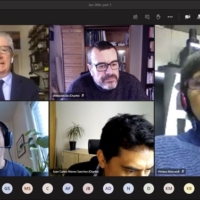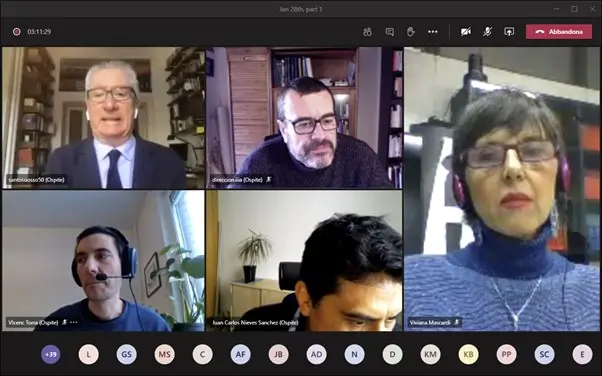On 28 and 29 January 2021, the DigForASP COST Action organised online conversations with more than 140 specialists in Artificial Intelligence, Digital Forensics, Data Privacy, Law, and Ethics.
Ethics and law are at the hearth of human societies since their dawn, and their relations have been studied for centuries. What is ethical, what is legal? And vice versa are the questions experts have discussed together.
During the two-days event, judges, lawyers, experts of Digital Forensics (DF), of Artificial Intelligence (AI), ethics and of data privacy shared their point of view on the ethical threats that the adoption of AI technologies may bring to their profession on the one hand, and how to mitigate them and turn them into opportunities, on the other.
This is not the case for the relations between ethics and more recent disciplines like Digital Forensics (DF) and Artificial Intelligence (AI), where the ethical question has been necessarily raised much more recently. Despite their short history, “Ethics in AI” and “Ethics in DF” are emerging as two among the biggest issues of this millennium.
DigForEthics was organized by Prof. Viviana MASCARDI from the University of Genova, Italy, and Prof. Juan Carlos NIEVES from Umeå University, Sweden, as part of the initiatives of the EU-funded project “DIGital FORensics: evidence Analysis via intelligent Systems and Practices” (DigForASP). The network explores the potential of the application of Artificial Intelligence and Automated Reasoning in the Digital Forensics field to create synergies between these fields.
The event attracted more than 140 registered participants with a peak of 70 online attendees on the first day. Overall, the level of discussion was very high and confirms that events like DigForEthics, where experts from different disciplines sit together and discuss not only general, but also very focussed and specific problems, are extremely needed.
The event opened on January 28th, 2021, with the welcome from the two organisers and chairs of DigForASP, Jesús MEDINA from the University of Cadiz, Spain and Stefania COSTANTINI from the University of L’Aquila, Italy.
Among the speakers, Virginia DIGNUM from Umeå University, Sweden, showed how to move from principles to action in the implementation of a Responsible AI.
In his talk on Community oriented AI, Carles SIERRA (IIIA-CSC, Spain) shared his vision on AI that can empower human communities to control their interaction software, while the Italian judge Amedeo SANTOSUOSSO pointed out that when we talk about risks and rights in the use of AI, we need methods of measurement. Vicenç TORRA from Umeå University, Sweden; presented data protection mechanisms that are compliant with privacy models, and still help to achieve a good trade-off between disclosure risk and data utility.
A round table with these experts followed, involving Hugh LAWSON-TANCRED from Birkbeck, University of London, UK, with the aim of discussing the relevance of the seven requirements identified by the Independent High-level Expert Group on Artificial Intelligence set up by the European Commission in the “Ethics Guidelines for Trustworthy AI” (2019). The experts also answered the many questions from the audience.
On January 29th, 2021, more experts were invited to give talks and participate in a round table. The discussion was more focused on the topics covered by the COST Action DigForASP, while still addressing general ethical issues in the use of AI. Stefania COSTANTINI from the University of L’Aquila, Italy, presented how to exploit logic-based approaches for machine ethics in the legal and digital forensics fields, whereas Francesca Alessandra LISI from the University of Bari, Italy, shared with the audience some recent results and activities in Trustworthy AI, with a focus on the gender dimension.
To complete the session Digital Forensics expert talks
David BILLARD from the University of Applied Sciences and Arts, Geneva, Switzerland, pointed out the main challenges in using data anonymisation for protecting people privacy in AI-augmented criminal investigations.
While Mattia EPIFANI, CEO of Reality Net System Solutions, Italy, showed how DF commercial tools he uses in his daily activity, incorporate AI.
The last talk was given by two lawyers, Andrea STANCHI and Francesco PEDRONI. Supported by the AI assistant Marshall they answered the question: “does Statute’s of Workers’ Right have something to teach?”
Additional information:
The detailed programme of the event is available here.


